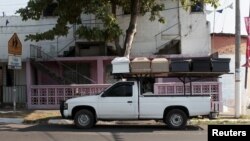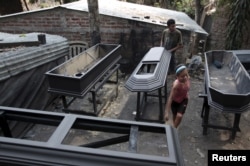As El Salvador reels from a record wave of murders and a stuttering economy that has forced tens of thousands to emigrate, one town has turned to an unlikely refuge: the coffin industry.
Jucuapa, a town of 18,000 people 116 kilometers (72 miles) east of San Salvador, has 18 such businesses listed. And a growing number of residents are leaving behind their low-profit trade in coffee and agriculture to set up impromptu workshops on their small farm or plot.
"There has been a rise in shops due to the economic situation," said Cesar Cruz, 36, who administers his father's business. "It's the area that generates the most jobs here."
Cruz's business now has 16 workers and makes some 40 weekly shipments throughout the country.
In the shade of trees in the patios of ramshackle workshops across town, carpenters fashion caskets from wooden boards lined against walls, before others line the coffins with white cloth and adorn them with fixtures.
The casket industry in Jucuapa spans the entire supply chain, from sawmills and carpenters to decorators, upholsterers, drivers and salesmen, with prices ranging from $100 to $1,200, depending on materials and labor.
Gang violence pushed homicides up by 70 percent in El Salvador during 2015, putting the country on track to overtake Honduras as the murder capital of the world. Murders continued to rise in the first three months of 2016, hitting an average of 22 a day, as powerful gangs known as maras fight for control of drug trafficking and extortion.
Each day of the week, Jucuapa's narrow streets overflow with pickups hauling coffins to funeral homes around the country and abroad.
"With or without murders, one can always [find] work because caskets go to other countries like Honduras and Guatemala," said Jose Flores, 24, who has spent five years working in the industry, making $15 for each coffin he assembles.
The spike in murders has challenged the government of leftist President Salvador Sanchez Ceren, who has trouble financing security plans and has instead focused efforts on controlling the more than 15,500 gang members locked up in 13 prisons, where many of them continue leading criminal activities.
Violence cost the poor Central American state some $4 billion in 2014, or 16 percent of its national income, according to El Salvador's central bank.
Funeral homes are one of the few industries that have benefited from the scourge, though even those working in the sector would prefer that business were not so good.
"Who wouldn't want to live in peace?" said Flores, the carpenter.






